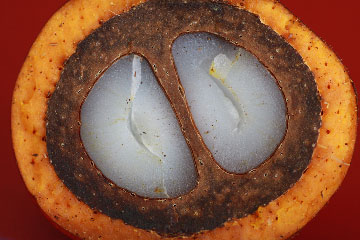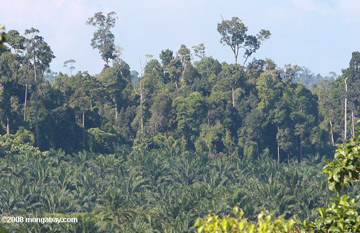Whole Foods pledges to use only sources of palm oil that have been independently verified and certified to meet environmental and social sustainability criteria in its private label brand products by 2012.
America’s largest organic grocer has announced its products will no longer use palm oil sourced from unsustainable producers, reports the Rainforest Action Network (RAN), an activist group that has led a campaign against destructive palm oil production. The move adds pressure on the palm oil industry to develop an effective and credible certification system for palm oil.
“Whole Foods Market is concerned with the social and environmental impacts of palm oil production in tropical rainforest ecosystems around the world,” Whole Foods said in a statement. “Whole Foods is committed to protecting rainforests, communities and our global climate, and therefore Whole Foods has partnered with the Institute for Marketecology (IMO), a highly regarded international certification agency whose social responsibility and fair trade certification program requires successful implementation of environmental, social responsibility, and sustainability practices on the land and within the company’s organization.”
 Oil palm seed. Photo by Rhett A. Butler |
“Whole Foods Market pledges to use IMO’s reliable certification program, along with independent supply chain verification, in the sourcing of palm oil in our private label products. Whole Foods Market pledges to support the development of more sources of sustainable, fairly traded palm oil, to ensure that palm oil in our private label brand products are not sourced from the conversion of rainforest ecosystems or from companies engaged in the conversion of natural forests and/or peatlands; respect the free, prior and informed consent of interested communities and meet or exceed RSPO (Roundtable on Sustainable Palm Oil) principles and criteria.”
“Whole Foods Market pledges that it will only use sources of palm oil independently verified and certified to these criteria in our private label brand products by 2012. Whole Foods Market calls on our peers in the food industry to join with us in this pledge.”
RAN welcomed the decision.
 Oil palm plantation and rainforest in Malaysian Borneo |
“With the statement on their website, Whole Foods Market is sending a clear signal that they do not want to be associated with the destruction of rainforests due to the expansion of oil palm plantations,” said Leila Salazar-Lopez, director of RAN’s Rainforest Agribusiness Campaign. “We applaud Whole Foods for their leadership and urge other companies and palm oil suppliers to add their voices to this call for change in the U.S. palm oil supply chain.”
In recent years the palm oil industry has been criticized by environmentalists due to a spate of reports and studies showing that palm oil production in Southeast Asia is driving large-scale destruction of rainforests and peatlands, putting rare and endangered species like the orangutan, the flat-headed cat, and pygmy elephants at risk. Further, conversion of natural ecosystems for oil palm plantations has been associated with the emissions of hundreds of millions of tons of greenhouse gases.
Some palm oil producers have responded to criticism by forming the Roundtable on Sustainable Palm Oil, a certification initiative that seeks to improve the environmental performance of the palm oil industry. The effort has been slow to get off the ground, beset by infighting and controversy, but many environmentalists believe RSPO is the best hope for bringing sustainability to the palm oil industry. The Whole Foods announcement is yet another impetus for the iniative: Unilever — the world’s largest corporate buyer of palm oil — has lately been particularly active in pushing for a credible certification system and dozens of food, cosmetic and consumer goods companies have signed RAN’s pledge